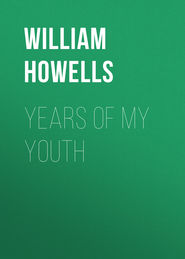По всем вопросам обращайтесь на: info@litportal.ru
(©) 2003-2025.
✖
The Daughter of the Storage
Настройки чтения
Размер шрифта
Высота строк
Поля
"An end to that thing," he partially assented, "but not that sort of thing."
"What do you mean?" she demanded excitedly, almost resentfully.
"I mean that the lunch is of the nature of the dinner, and that in the country we shall begin lunching where we left off dining."
"Not instantly," she protested shrilly. "There will be nobody there for a while – not for a whole month, nearly."
"They will be there before you can turn round, almost; and then you women will begin feeding one another there before you have well left off here."
"We women!" she protested.
"Yes, you – you women. You give the dinners. Can you deny it?"
"It's because we can't get you to the lunches."
"In the country you can; and so you will give the lunches."
"We would give dinners if it were not for the distance, and the darkness on those bad roads."
"I don't see where your reasoning is carrying you."
"No," she despaired, "there is no reason in it. No sense. How tired of it all I am! And, as you say, it will be no time before it is all going on again."
They computed the number of dinners they had given during the winter; that was not hard, and the sum was not great: six or seven at the most, large and small. When it came to the dinners they had received, it was another thing; but still she considered, "Were they really so few? It's nothing to what the English do. They never dine alone at home, and they never dine alone abroad – of course not! I wonder they can stand it. I think a dinner, the happy-to-accept kind, is always loathsome: the everlasting soup, if there aren't oysters first, or grape-fruit, or melon, and the fish, and the entrée, and the roast and salad, and the ice-cream and the fruit nobody touches, and the coffee and cigarettes and cigars – how I hate it all!"
Lindora sank back in her chair and toyed desperately with the fragment of bacon on her plate.
"And yet," Florindo said, "there is a charm about the first dinner of autumn, after you've got back."
"Oh, yes," she assented; "it's like a part of our lost youth. We think all the dinners of the winter will be like that, and we come away beaming."
"But when it keeps on and there's more and more of our lost youth, till it comes to being the whole – "
"Florindo!" she stopped him. He pretended that he was not going to have said it, and she resumed, dreamily, "I wonder what it is makes it so detestable as the winter goes on."
"All customs are detestable, the best of them," he suggested, "and I should say, in spite of the first autumnal dinner, that the society dinner was an unlovely rite. You try to carry if off with china and glass, and silver and linen, and if people could fix their minds on these, or even on the dishes of the dinner as they come successively on, it would be all very well; but the diners, the diners!"
"Yes," she said, "the old men are hideous, certainly; and the young ones – I try not to look at them, poking things into the hollows of their faces with spoons and forks – "
"Better than when it was done with knives! Still, it's a horror! A veteran diner-out in full action is certainly a hideous spectacle. Often he has few teeth of his own, and the dentists don't serve him perfectly. He is in danger of dropping things out of his mouth, both liquids and solids: better not look! His eyes bulge and roll in his head in the stress of mastication and deglutition; his color rises and spreads to his gray hair or over his baldness; his person seems to swell vividly in his chair, and when he laughs – "
"Don't, Florindo! It is awful."
"Well, perhaps no worse than the sight of a middle-aged matron tending to overweight and bulking above her plate – "
"Yes, yes! That's dreadful, too. But when people are young – "
"Oh, when people are young!" He said this in despair. Then he went on in an audible muse. "When people are young they are not only in their own youth; they are in the youth of the world, the race. They dine, but they don't think of the dinner or the unpleasantness of the diners, and the grotesqueness of feeding in common. They think – " he broke off in defect of other ideas, and concluded with a laugh, "they think of themselves. And they don't think of how they are looking."
"They needn't; they are looking very well. Don't keep harping on that! I remember when we first began going to dinners, I thought it was the most beautiful thing in the world. I don't mean when I was a girl; a girl only goes to a dinner because it comes before a dance. I mean when we were young married people; and I pinned up my dress and we went in the horse-cars, or even walked. I enjoyed every instant of it: the finding who was going to take me in and who you were; and the going in; and the hovering round the table to find our places from the cards; and the seeing how you looked next some one else, and wondering how you thought I looked; and the beads sparkling up through the champagne and getting into one's nose; and the laughing and joking and talking! Oh, the talking! What's become of it? The talking, last night, it bored me to death! And what good stories people used to tell, women as well as men! You can't deny it was beautiful."
"I don't; and I don't deny that the forms of dining are still charming. It's the dining itself that I object to."
"That's because your digestion is bad."
"Isn't yours?"
"Of course it is. What has that got to do with it?"
"It seems to me that we have arrived at what is called an impasse in French." He looked up at the clock on the wall, and she gave a little jump in her chair. "Oh, there's plenty of time. The taxi won't be here for half an hour yet. Is there any heat left in that coffee?"
"There will be," she said, and she lighted the lamp under the pot. "But I don't like being scared out of half a year's growth."
"I'm sorry. I won't look at the clock any more; I don't care if we're left. Where were we? Oh, I remember – the objection to dining itself. If we could have the forms without the facts, dining would be all right. Our superstition is that we can't be gay without gorging; that society can't be run without meat and drink. But don't you remember when we first went to Italy there was no supper at Italian houses where we thought it such a favor to be asked?"
"I remember that the young Italian swells wouldn't go to the American and English houses where they weren't sure of supper. They didn't give supper at the Italian houses because they couldn't afford it."
"I know that. I believe they do, now. But —
'Sweet are the uses of adversity,'
and the fasting made for beauty then more than the feasting does now. It was a lovelier sight to see the guests of those Italian houses conversing together without the grossness of feeding or being fed – the sort of thing one saw at our houses when people went out to supper."
"I wonder," Lindora said, "whether the same sort of thing goes on at evening parties still – it's so long since I've been at one. It was awful standing jammed up in a corner or behind a door and eating vis-à-vis with a man who brought you a plate; and it wasn't much better when you sat down and he stood over you gabbling and gobbling, with his plate in one hand and his fork in the other. I was always afraid of his dropping things into my lap; and the sight of his jaws champing as you looked up at them from below!"
"Yes, ridiculous. But there was an element of the grotesque in a bird's-eye view of a lady making shots at her mouth with a spoon and trying to smile and look spirituelle between the shots."
Lindora as she laughed bowed her forehead on the back of her hand in the way Florindo thought so pretty when they were both young. "Yes," she said, "awful, awful! Why should people want to flock together when they feed? Do you suppose it's a survival of the primitive hospitality when those who had something to eat hurried to share it with those who had nothing?"
"Possibly," Florindo said, flattered into consequence by her momentary deference, or show of it. "But the people who mostly meet to feed together now are not hungry; they are already so stuffed that they loathe the sight of the things. Some of them shirk the consequences by frankly dining at home first, and then openly or covertly dodging the courses."
"Yes, and you hear that praised as a mark of high civilization, or social wisdom. I call it wicked, and an insult to the very genius of hospitality."
"Well, I don't know. It must give the faster a good chance of seeing how funny the feeders all look."
"I wonder, I do wonder, how the feeding in common came to be the custom," she said, thoughtfully. "Of course where it's done for convenience, like hotels or in boarding-houses – but to do it wantonly, as people do in society, it ought to be stopped."
"We might call art to our aid – have a large tableful of people kodaked in the moments of ingulfing, chewing, or swallowing, as the act varied from guest to guest; might be reproduced as picture postals, or from films for the movies. That would give the ten and twenty cent audiences a chance to see what life in the exclusive circles was."
She listened in dreamy inattention. "It was a step in the right direction when people began to have afternoon teas. To be sure, there was the biting and chewing sandwiches, but you needn't take them, and most women could manage their teacups gracefully."
"Or hide their faces in them when they couldn't."
"Only," she continued, "the men wouldn't come after the first go off. It was as bad as lunches. Now that the English way of serving tea to callers has come in, it's better. You really get the men, and it keeps them from taking cocktails so much."
"They're rather glad of that. But still, still, there's the guttling and guzzling."
"It's reduced to a minimum."
"What do you mean?" she demanded excitedly, almost resentfully.
"I mean that the lunch is of the nature of the dinner, and that in the country we shall begin lunching where we left off dining."
"Not instantly," she protested shrilly. "There will be nobody there for a while – not for a whole month, nearly."
"They will be there before you can turn round, almost; and then you women will begin feeding one another there before you have well left off here."
"We women!" she protested.
"Yes, you – you women. You give the dinners. Can you deny it?"
"It's because we can't get you to the lunches."
"In the country you can; and so you will give the lunches."
"We would give dinners if it were not for the distance, and the darkness on those bad roads."
"I don't see where your reasoning is carrying you."
"No," she despaired, "there is no reason in it. No sense. How tired of it all I am! And, as you say, it will be no time before it is all going on again."
They computed the number of dinners they had given during the winter; that was not hard, and the sum was not great: six or seven at the most, large and small. When it came to the dinners they had received, it was another thing; but still she considered, "Were they really so few? It's nothing to what the English do. They never dine alone at home, and they never dine alone abroad – of course not! I wonder they can stand it. I think a dinner, the happy-to-accept kind, is always loathsome: the everlasting soup, if there aren't oysters first, or grape-fruit, or melon, and the fish, and the entrée, and the roast and salad, and the ice-cream and the fruit nobody touches, and the coffee and cigarettes and cigars – how I hate it all!"
Lindora sank back in her chair and toyed desperately with the fragment of bacon on her plate.
"And yet," Florindo said, "there is a charm about the first dinner of autumn, after you've got back."
"Oh, yes," she assented; "it's like a part of our lost youth. We think all the dinners of the winter will be like that, and we come away beaming."
"But when it keeps on and there's more and more of our lost youth, till it comes to being the whole – "
"Florindo!" she stopped him. He pretended that he was not going to have said it, and she resumed, dreamily, "I wonder what it is makes it so detestable as the winter goes on."
"All customs are detestable, the best of them," he suggested, "and I should say, in spite of the first autumnal dinner, that the society dinner was an unlovely rite. You try to carry if off with china and glass, and silver and linen, and if people could fix their minds on these, or even on the dishes of the dinner as they come successively on, it would be all very well; but the diners, the diners!"
"Yes," she said, "the old men are hideous, certainly; and the young ones – I try not to look at them, poking things into the hollows of their faces with spoons and forks – "
"Better than when it was done with knives! Still, it's a horror! A veteran diner-out in full action is certainly a hideous spectacle. Often he has few teeth of his own, and the dentists don't serve him perfectly. He is in danger of dropping things out of his mouth, both liquids and solids: better not look! His eyes bulge and roll in his head in the stress of mastication and deglutition; his color rises and spreads to his gray hair or over his baldness; his person seems to swell vividly in his chair, and when he laughs – "
"Don't, Florindo! It is awful."
"Well, perhaps no worse than the sight of a middle-aged matron tending to overweight and bulking above her plate – "
"Yes, yes! That's dreadful, too. But when people are young – "
"Oh, when people are young!" He said this in despair. Then he went on in an audible muse. "When people are young they are not only in their own youth; they are in the youth of the world, the race. They dine, but they don't think of the dinner or the unpleasantness of the diners, and the grotesqueness of feeding in common. They think – " he broke off in defect of other ideas, and concluded with a laugh, "they think of themselves. And they don't think of how they are looking."
"They needn't; they are looking very well. Don't keep harping on that! I remember when we first began going to dinners, I thought it was the most beautiful thing in the world. I don't mean when I was a girl; a girl only goes to a dinner because it comes before a dance. I mean when we were young married people; and I pinned up my dress and we went in the horse-cars, or even walked. I enjoyed every instant of it: the finding who was going to take me in and who you were; and the going in; and the hovering round the table to find our places from the cards; and the seeing how you looked next some one else, and wondering how you thought I looked; and the beads sparkling up through the champagne and getting into one's nose; and the laughing and joking and talking! Oh, the talking! What's become of it? The talking, last night, it bored me to death! And what good stories people used to tell, women as well as men! You can't deny it was beautiful."
"I don't; and I don't deny that the forms of dining are still charming. It's the dining itself that I object to."
"That's because your digestion is bad."
"Isn't yours?"
"Of course it is. What has that got to do with it?"
"It seems to me that we have arrived at what is called an impasse in French." He looked up at the clock on the wall, and she gave a little jump in her chair. "Oh, there's plenty of time. The taxi won't be here for half an hour yet. Is there any heat left in that coffee?"
"There will be," she said, and she lighted the lamp under the pot. "But I don't like being scared out of half a year's growth."
"I'm sorry. I won't look at the clock any more; I don't care if we're left. Where were we? Oh, I remember – the objection to dining itself. If we could have the forms without the facts, dining would be all right. Our superstition is that we can't be gay without gorging; that society can't be run without meat and drink. But don't you remember when we first went to Italy there was no supper at Italian houses where we thought it such a favor to be asked?"
"I remember that the young Italian swells wouldn't go to the American and English houses where they weren't sure of supper. They didn't give supper at the Italian houses because they couldn't afford it."
"I know that. I believe they do, now. But —
'Sweet are the uses of adversity,'
and the fasting made for beauty then more than the feasting does now. It was a lovelier sight to see the guests of those Italian houses conversing together without the grossness of feeding or being fed – the sort of thing one saw at our houses when people went out to supper."
"I wonder," Lindora said, "whether the same sort of thing goes on at evening parties still – it's so long since I've been at one. It was awful standing jammed up in a corner or behind a door and eating vis-à-vis with a man who brought you a plate; and it wasn't much better when you sat down and he stood over you gabbling and gobbling, with his plate in one hand and his fork in the other. I was always afraid of his dropping things into my lap; and the sight of his jaws champing as you looked up at them from below!"
"Yes, ridiculous. But there was an element of the grotesque in a bird's-eye view of a lady making shots at her mouth with a spoon and trying to smile and look spirituelle between the shots."
Lindora as she laughed bowed her forehead on the back of her hand in the way Florindo thought so pretty when they were both young. "Yes," she said, "awful, awful! Why should people want to flock together when they feed? Do you suppose it's a survival of the primitive hospitality when those who had something to eat hurried to share it with those who had nothing?"
"Possibly," Florindo said, flattered into consequence by her momentary deference, or show of it. "But the people who mostly meet to feed together now are not hungry; they are already so stuffed that they loathe the sight of the things. Some of them shirk the consequences by frankly dining at home first, and then openly or covertly dodging the courses."
"Yes, and you hear that praised as a mark of high civilization, or social wisdom. I call it wicked, and an insult to the very genius of hospitality."
"Well, I don't know. It must give the faster a good chance of seeing how funny the feeders all look."
"I wonder, I do wonder, how the feeding in common came to be the custom," she said, thoughtfully. "Of course where it's done for convenience, like hotels or in boarding-houses – but to do it wantonly, as people do in society, it ought to be stopped."
"We might call art to our aid – have a large tableful of people kodaked in the moments of ingulfing, chewing, or swallowing, as the act varied from guest to guest; might be reproduced as picture postals, or from films for the movies. That would give the ten and twenty cent audiences a chance to see what life in the exclusive circles was."
She listened in dreamy inattention. "It was a step in the right direction when people began to have afternoon teas. To be sure, there was the biting and chewing sandwiches, but you needn't take them, and most women could manage their teacups gracefully."
"Or hide their faces in them when they couldn't."
"Only," she continued, "the men wouldn't come after the first go off. It was as bad as lunches. Now that the English way of serving tea to callers has come in, it's better. You really get the men, and it keeps them from taking cocktails so much."
"They're rather glad of that. But still, still, there's the guttling and guzzling."
"It's reduced to a minimum."











